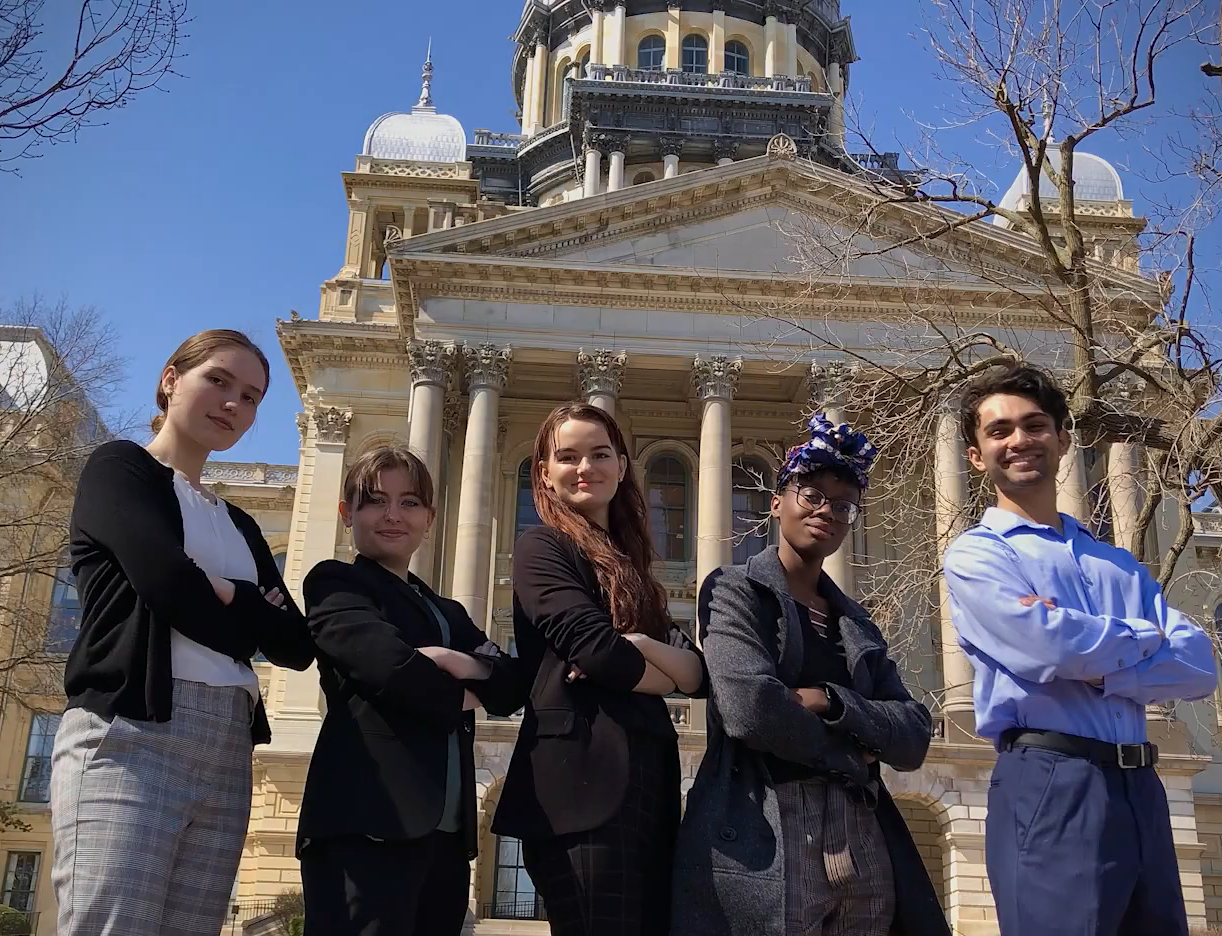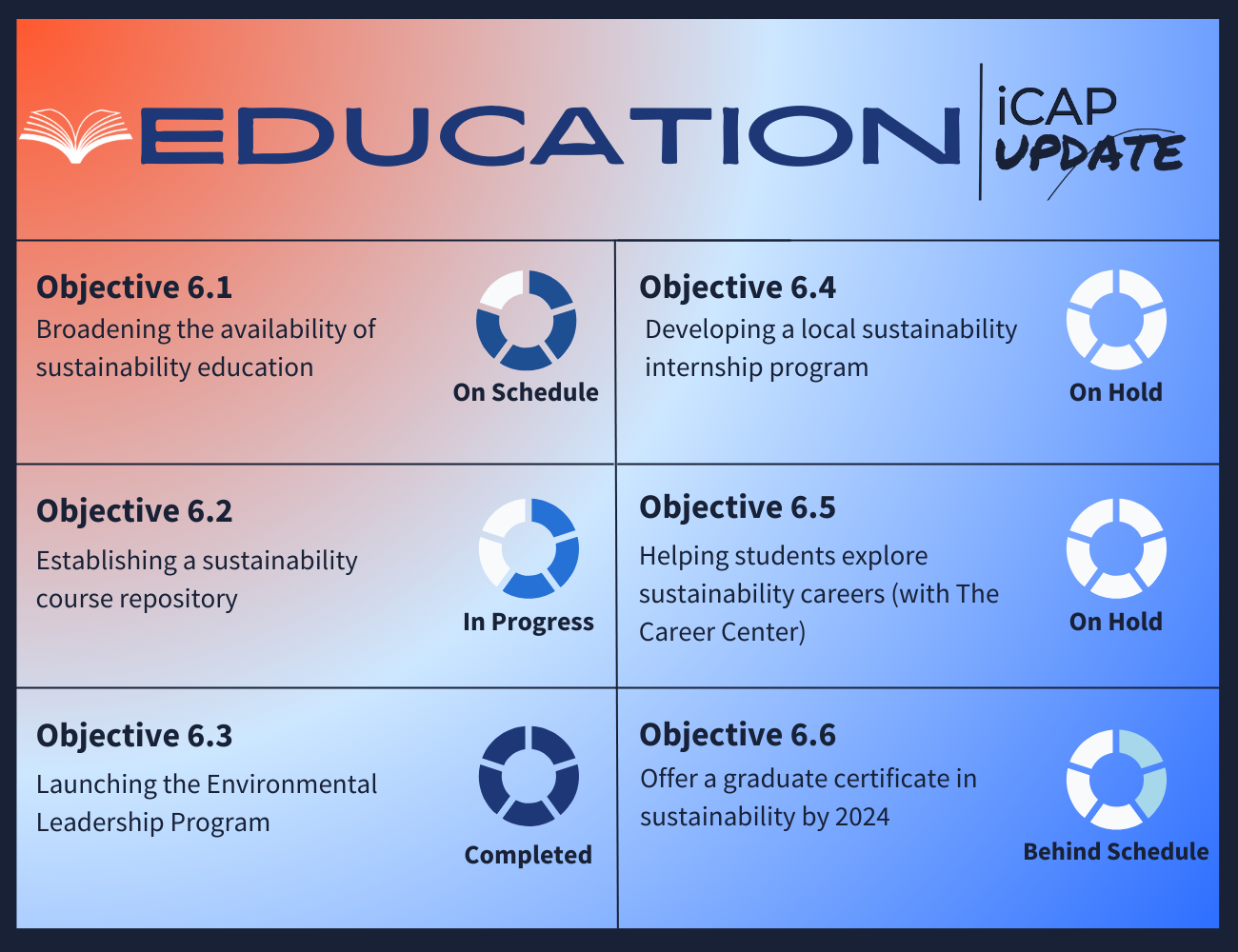
The University of Illinois Urbana-Champaign is already past the halfway point from Illinois Climate Action Plan 2020 to iCAP 2025. It’s time to check in with each of the iCAP topical chapters to gauge progress, address the challenges our campus faces, and celebrate some achievements. This month, iSEE Communications Intern Gabe Lareau examines the Education chapter to see how the university is keeping up with its commitment to give students a deeper understanding of what it means to be sustainable.

Students in iSEE’s Environmental Leadership Program visit Springfield each year to lobby legislators and state agencies on environmental policies. Credit: iSEE
Among the University of Illinois’ many offices, departments, and levels of administration, one core mission rises to the top: to educate students.
The education component to the climate fight is just as vital. Amidst wildfires, heatwaves, and floods, educating the populace about our current situation has become a difficult, uphill battle with dire consequences. In America, only 37% of adults say dealing with climate change should be a top priority.
Education has the potential to raise awareness, denote the best sustainability practices, dissipate misinformation, and spur action. In the 2020 Illinois Climate Action Plan (iCAP), the Education chapter laid out six objectives to do just that.

The campus has made strides in educating students about climate change by launching the Environmental Leadership Program and by pushing to expand sustainability General Education options. However, there’s room for progress in setting up our students for success post-graduation by developing sustainability internship and career opportunities. Graphic credit: Tori Lawlor/iSEE Communications
Its achievements are inspiring. The Education iCAP Team’s loftiest assignments have become its greatest successes, namely working to incorporate sustainability into general education, expanding opportunities for graduate students, and developing the Environmental Leadership Program. The team’s progress has put the university’s sustainability curricula into a strong position going into the 2025 iCAP.
Here’s an update on the Education Team’s progress, objective by objective:
6.1: “Broaden the availability of sustainability education, beginning with first-year student orientation and continuing through commencement.”
As the first and foremost objective in the Education portion of the iCAP, the successful completion of incorporating sustainability into the general education track is vital. If completed, it will affect the curriculum of every one of the university’s 35,000 undergraduate students — a potentially massive impact.
To ensure the success of this goal, iCAP 2020 detailed four possible options, two of which have since been eliminated. The prospects of creating a first-year student sustainability seminar and implementing a sustainability unit in 100-level required classes like LAS 101 were deemed not engaging enough to be effective by students.
The most viable option, according to Education Team member Eric Green, is incorporating a sustainability general education requirement. Its proposal is written, and “now the team is building support,” said Green, who also serves as iSEE’s Senior Academic Program Instructor/Advisor.
The sustainability requirement will most likely be a “General Education Requirement Option” within the Natural Sciences & Technology requisite. Whereas students have two choices within this requisite today — Physical Sciences and Life Sciences — fulfilling this objective would give them option of choosing a class (or several) within a “Sustainability” category.
If Natural Sciences & Technology isn’t their cup of tea, Green said that sustainability options within the Social & Behavioral Sciences and Humanities & the Arts Gen-Ed requirements are still on the table.
To be clear, completing this iCAP objective wouldn’t add to the number of General Education classes students would have to take. Instead, it would simply highlight sustainability classes on campus and, hopefully, encourage more undergraduates to incorporate sustainability sometime during their higher education.
In summer 2023, Green and the Education Team hosted “open house” meetings with various department heads to refine the official proposal. After meeting with each college’s deans in late fall, Green hopes that the Education Team’s proposal for a sustainability general education requirement will be approved by the Urbana-Champaign Senate near the end of Spring 2024.
The fourth and final option of a sustainability workshop is a real possibility and currently in development, according to Green. If it came to fruition, it would most likely resemble the First Year Consent and Relationship Education (FYCARE) workshop on sexual assault required for all incoming students.
6.2: “Establish a comprehensive online repository for courses and academic programs with sustainability content.”
On the iSEE website, under “Education,” students can access hundreds of courses that deal with sustainability, energy conservation, and environmentalism. These courses — everything from Urban Transportation Planning to Marine Biology — span 50 different departments at both the undergraduate and graduate levels.
However, that public list is no longer updated regularly. With departments changing course offerings every semester and certain courses changing curricula because of new instructors, keeping up with where each department stands on offering sustainability courses is a monumental task. On top of that, “undergrads weren’t really using it,” said Green, referring to the original course list.
Changing up its strategy, the Education Team is revising the course list for the latest semester and streamlining how students can search for available courses. The idea is that inputting keywords to search by topic instead of by name will allow students to more efficiently search for sustainability courses that align with their interests.
And while this objective was intended as a resource for students, it also serves a dual purpose in the university’s self-reporting.
The Sustainability Tracking, Assessment & Rating System (STARS) is a tool created by the Association for the Advancement of Sustainability in Higher Education (AASHE) that catalogs and rates how sustainable higher education institutions are across a variety of categories.
In the 2022 report, the University of Illinois scored 4.31 points out of a possible 14 in the “Academic Courses” credit, under the “Curriculum” subcategory. But AASHE is exploring a new scoring system for its Education category. Once that process is complete, the university’s STARS rating — and its reputation as a nationwide sustainability leader — should see improvement.
6.3: “Launch an undergraduate Environmental Leadership Program (ELP).”
“It’s a thing!” as Green says.
The Environmental Leadership program (ELP) launched in Spring 2021 and has increased its enrollment in each subsequent year; the most recent cohort in Spring 2023 enrolled 25 students. The program consists of an introductory, two-day workshop and meetings throughout the semester that culminate in visits to both Champaign and Urbana City Council meetings and a trip to the State Capitol in Springfield.
During the program, students learn the inner workings of state and local politics as well as how to craft a unique message that effectively advocates for the environment. The students put these strategies to use as they actively lobby for specific environmental policies with lawmakers.
Next spring, students will also visit Chicago during Spring Break to talk with business leaders about corporate sustainability, Green said.
6.4: “Develop a sustainability internship program by partnering with businesses, nonprofits, local governments, and cultural institutions in Central Illinois.”
During the Spring 2021 semester, ENVS 491 student Carissa Mysliwiec submitted a report on the possibility of a University of Illinois Sustainability Internship Program. After a semester’s worth of meetings with local and regional governments and organizations, Mysliwiec calculated a budget upwards of $5,000 per intern and estimated the program would consist of five to 10 students.
Unfortunately, since then no new updates have emerged. As of Fall 2023, the funding for this objective has not materialized and the possibility of a sustainability internship program is on hold.
6.5: “Partner with The Career Center to help students explore and discover career interests related to sustainability.”
Like so many organizations post-COVID, both iSEE and the University Career Center have dealt with staffing shortages that have stunted certain projects, this objective numbering among them.
Now that iSEE has a new Sustainability Coordinator and the Career Center is hiring new staff, Green is confident that an in-depth collaboration can finally take off to make finding careers in sustainability an easy process for students. Until then, this objective remains on hold.
6.6: “Offer a new graduate certificate in sustainability by 2024.”
Thanks to one of iSEE’s directors and a close institutional partner, the Education Team has so far had its work taken care of in making a graduate certificate in sustainability a reality.
Luis Rodríguez is a U of I Associate Professor of Agricultural and Biological Engineering as well as iSEE’s Associate Director for Education & Outreach. His vision for a “virtual resource center,” as Green put it, would manifest in the form of a website that would make it easier than ever for graduate students, faculty, and staff to share sustainability research and resources.
At the same time, the Prairie Research Institute was recently awarded an “Investment for Growth Grant” from the Office of the Provost to help develop courses within the proposed graduate certificate.
Both developments, while not definitive steps forward, set the stage for a graduate certificate to happen eventually. “Right now, we probably won’t hit 2024 and the timeframe is unknown,” said Green.
By taking the initiative to find solutions, the Education Team and its partners are leading in sustainability by example: exactly what the university expects its students to do. But, in order to do that, we must first equip students with the tools they need to succeed: in a word, educate.